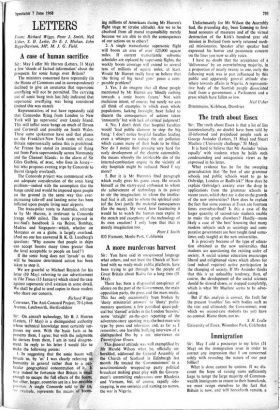Immigration
Sir: May I add a postscript to my letter (31 May) on the immigration issue in order to correct any impression that I am concerned solely with revealing the nature of our past follies?
What is done cannot be undone. If we dis- count the hope of raising sums sufficiently large to tempt the large majority of Common- wealth immigrants to return to their homelands, 4,P we must resign ourselves to the fact that Britain is now, and will henceforth remain, a multi-racial society. Indeed, the proportion' of non-white residents is expected to grow over the years, even without further immigration, legal and illegal. There is, therefore, every- thing to be said for our going to any expense and trouble to prevent the virus of American race conflicts from infecting our land. (At the same time, we can only hope that anxieties over racial issues will not, as they have done in the United States, reach such dimensions as to distract the public's attention from the tangle of urgent social problems created by the rapid economic growth and the unprece- dented advance of modern technology.) Yet measures that are now being taken in good faith have disadvantages that bear thinking about. The establishment of a Race Relations Board, and the enactment of special race legislation, may perhaps seem justified in the circumstances. But they also act con- tinuously to remind us that there are elements of society in our midst for which the ordinary laws and institutions of the country do not suffice.
Again, press coverage of race incidents and alleged discrimination is unavoidable. But in- forming the public without inflaming any part of it is the ideal to be pursued. What is of equal concern is the recent flood of newspaper articles and television features calculated to shame the public into better treatment of the newcomers. It is doubtful whether all this acts to promote racial harmony. Not only can it become a frightful bore; the repeated presen- tation of immigrants as deserving underdogs, and their plight attributable in the main to callous treatment by the indigenous popula- tion, can be worse than doing nothing. For it creates a hyper-consciousness about coloured people, an excessive caution, an over-considerateness, and an artificial humour in dealing with them, productive only of repressed irritation on both sides. Even the most liberal white begins to jib at the endless tweaking of his conscience by journa- lists and others eager to find a vocation in exposing racial disharmonies. Such conse- quences, by no means hypothetical, are sub- versive of progress towards an easier and more open relationship which is the precondition of racial assimilation.
It is not impossible that less pressure from above, less condescension, less publicity, less musing and moralising by all of us will— granted that the immigration phase is at an end—better enable the new races to come to- gether with the existing population and in time, and in their own way, discover their common humanity.
E. J. Mishan London School of Economics, Houghton Street, London WC2







































 Previous page
Previous page